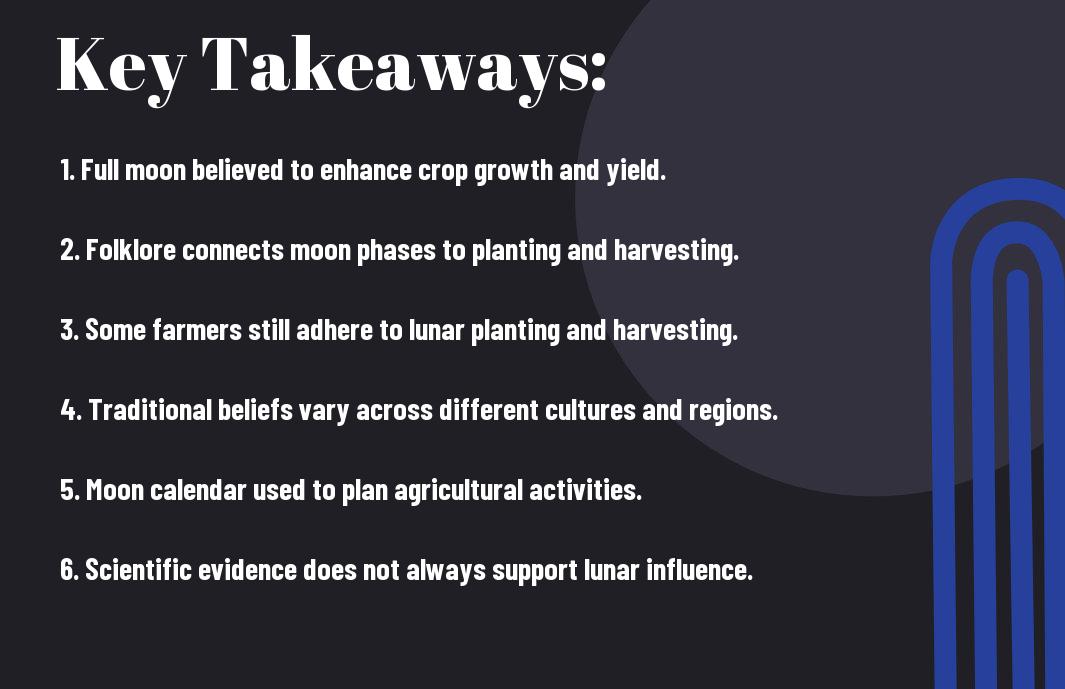As an avid explorer of ancient agricultural practices, I have come across the fascinating tradition of harvesting on a full moon. This age-old belief has been passed down from generation to generation and still holds a significant place in many farming communities around the world. The practice is rooted in the idea that the energy and illumination of the full moon enhance the ripening and quality of crops. While some may dismiss it as mere superstition, there are undeniable benefits and positives associated with this practice. In this blog post, I will delve into the traditional agricultural beliefs surrounding harvesting on a full moon, examining the rationale behind the practice and its impact on crop yield. Whether you are a skeptic or a believer, this age-old practice is certainly worth exploring.
Key Takeaways:
- Significance of the Full Moon: Full moons are believed to have a powerful energy that impacts the growth and harvest of crops in traditional agricultural beliefs.
- Timing of Harvesting: Many traditional agricultural communities believe that harvesting crops during a full moon can lead to higher yields and better quality produce.
- Cultural Traditions: Harvesting on a full moon is a practice deeply rooted in the cultural and spiritual traditions of many agricultural societies around the world.
- Astrological Influence: Some traditional agricultural beliefs attribute the influence of the moon on crop growth to astrological factors, linking specific phases of the moon to optimal harvesting times.
- Continued Relevance: Despite advancements in agricultural technology, the tradition of harvesting on a full moon persists in many communities, showcasing the lasting impact of traditional agricultural beliefs.
The Significance of the Full Moon in Traditional Agriculture
The full moon has held great significance in traditional agriculture for centuries. Its powerful impact on the earth’s natural rhythms has long been recognized and respected by agricultural communities. As a farmer, understanding the importance of the full moon in your planting and harvesting schedules can be crucial to the success of your crops.
Historical Background
Historically, the full moon has been a symbol of fertility and abundance in many cultures around the world. Ancient agricultural societies often timed their planting and harvesting activities to coincide with the lunar cycle, believing that the moon’s gravitational pull influenced the flow of moisture in the soil. Additionally, the full moon was often associated with rituals and ceremonies that honored the earth and its natural cycles.
Cultural Beliefs and Practices
Cultural beliefs and practices surrounding the full moon in traditional agriculture vary widely from region to region. In some cultures, the full moon is seen as a time of great power and energy, and is celebrated with festivals and ceremonies. Others believe that certain crops should only be planted or harvested during specific phases of the moon, in order to ensure a bountiful yield. These beliefs and practices have been passed down through generations and continue to play a significant role in many farming communities today.

How the Full Moon Impacts Harvesting
Even though the scientific community may not give credence to the idea of the full moon affecting harvesting, traditional agricultural beliefs have long held that the lunar cycle has an impact on the success of the harvest. The Harvest Moon and Its Connection to Agriculture is a topic that has been handed down through generations, and many farmers continue to believe in its significance.
Lunar Calendar and Agricultural Activities
According to traditional agricultural beliefs, the full moon is a crucial time for harvesting because the moon exerts its greatest gravitational pull, making it easier to pluck fruits, vegetables, and grains from the earth. The >strong>lunar calendar is used to determine the best time for planting, tending to, and harvesting crops. Many farmers still swear by this method and have seen positive results in their fields.
Weather Patterns and Lunar Cycles
Another aspect to consider is the relationship between the full moon and weather patterns. Traditional beliefs suggest that lunar cycles can influence weather conditions, affecting the success of the harvest. It is believed that a full moon can bring clear skies or increase chances of rain, impacting the quality and quantity of the crops being harvested. It is important to pay attention to these patterns, as they can greatly influence the outcome of your harvest.
For centuries, farmers and gardeners have observed various rituals and customs associated with harvesting during a full moon. This practice is deeply rooted in traditional agricultural beliefs and is believed to have a significant impact on crop yield and quality. While modern farming methods may not always align with these ancient practices, there is a growing interest in understanding the lunar influence on gardening and its potential benefits.
Blessings and Offerings
One common ritual associated with full moon harvesting is the offering of blessings to the land and the crops. Many farmers believe that performing a ceremony or prayer during the full moon can bring prosperity and abundance to their harvest. Offerings such as grains, fruits, or other items grown on the land are often given as a symbol of gratitude and respect for the fertility of the earth. This tradition serves as a reminder of the interconnectedness between humans and the natural world, and the importance of honoring and nurturing the land that sustains us.
Folklore and Superstitions
Full moon harvesting is often surrounded by a rich tapestry of folklore and superstitions passed down through generations. In many cultures, it is believed that crops harvested during a full moon will have increased nutritional value and flavor. Conversely, there are also superstitions warning against the dangers of working in the fields under a full moon, with some believing that it can bring bad luck or result in spoiled crops. These beliefs are deeply ingrained in the agricultural traditions of various cultures and continue to influence the practices of farmers and gardeners around the world.

Harvesting on a Full Moon – Traditional Agricultural Beliefs
Considering all points discussed, it is evident that traditional agricultural beliefs surrounding the practice of harvesting on a full moon have been deeply rooted in many cultures for centuries. While modern science may not fully support these beliefs, there is still a strong cultural and historical significance attached to them. It is important to respect and understand the traditional agricultural practices of various communities, even if they may not align with our current scientific knowledge. Ultimately, whether or not you choose to harvest on a full moon, it is crucial to acknowledge and appreciate the rich traditions and beliefs that have been passed down from generation to generation.
FAQ
Q: What is the significance of harvesting on a full moon?
A: Harvesting on a full moon is a traditional agricultural belief that dates back centuries. It is believed that the gravitational pull of the moon during a full moon phase helps to draw moisture up from the soil, resulting in juicier and more flavorful fruits and vegetables.
Q: Is there any scientific evidence to support the belief in harvesting on a full moon?
A: While there is no scientific evidence to support the belief in harvesting on a full moon, many farmers and gardeners continue to follow this tradition based on personal observations and experiences. It is important to note that the practice of harvesting on a full moon is rooted in folklore and cultural tradition rather than empirical evidence.
Q: Are there specific crops that are believed to benefit the most from harvesting on a full moon?
A: According to traditional agricultural beliefs, crops that are harvested for their fruits and vegetables such as tomatoes, peppers, cucumbers, and berries are believed to benefit the most from harvesting on a full moon. Additionally, root crops such as potatoes, carrots, and beets are also thought to benefit from the increased moisture levels in the soil during a full moon phase.
Q: What are some practical tips for harvesting on a full moon?
A: When harvesting on a full moon, it is important to plan ahead and ensure that you have the necessary tools and equipment ready. Additionally, it is advisable to check the weather forecast to ensure optimal harvesting conditions. It is also recommended to harvest early in the morning or late in the evening when the moisture levels in the soil are at their highest.
Q: Is it necessary to follow the tradition of harvesting on a full moon?
A: The decision to harvest on a full moon is ultimately a personal choice. While some farmers and gardeners choose to follow this tradition based on cultural beliefs, others may prefer to rely on modern agricultural practices and scientific knowledge. Ultimately, the most important factor in successful harvesting is careful planning, attention to detail, and proper timing, regardless of the lunar phase.









Leave a comment